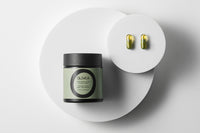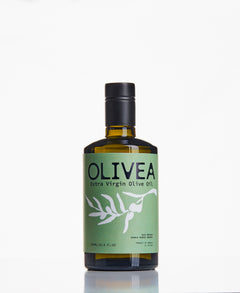Extra virgin olive oil is the key ingredient of the Mediterranean diet.
Multiple large-scale human studies published in high impact peer-reviewed journals have associated olive oil consumption with significant cardiovascular benefit:
- PREvención con DIeta MEDiterránea (PREDIMED) clinical trial1–3
- European Prospective Investigation into Cancer and Nutrition (EPIC)4–6
- The Three-City (3C) Study7,8
- Health Professionals Follow-up Study/Nurse’s Health Study9,10
These studies include more than 150,000 people and associate olive oil consumption with a 25-50% reduction in heart attacks and strokes. The more olive oil consumed, the more pronounced the associated health benefits are.
It is no surprise that the American Heart Association recommends the Mediterranean diet and avoiding animal fats (e.g., butter) and tropical oils (e.g., coconut) in favor of liquid plant oils11, like olive oil.
Not all olive oil is created equal though and the best evidence is for extra virgin olive oil (EVOO) with its high phenolic content and low acidity.
Olive oil is severely lacking in Western diets, while being consumed in copious amounts in longevity Blue zones like the Greek island of Icaria12.
For Olivea, we source the highest quality extra virgin olive oil solely from Greece. Our local producers are located in ***
Our goal is to promote cardiovascular health by increasing the amount of high-quality olive oil consumed worldwide.
- Phenolic compounds
This strong association between olive oil and cardiovascular benefit begs the question: what component in olive oil is responsible?
The best evidence to date supports olive oil’s phenolic compounds (polyphenols).
Small-scale human and animal studies have illustrated olive oil polyphenols’ beneficial properties:
- Anti-oxidative13–15
- Anti-inflammatory16,17
- Anti-carcinogenic18–20
Key among olive oil’s more than 30 phenols is hydroxytyrosol, which along with its metabolites has a well described anti-oxidative profile21,22.
In recognition of this evidence, the European Food Safety Authority (EFSA) permits olive oil products contributing at least 5 mg of hydroxytyrosol per day to carry the health claim: “polyphenols from olive [oil] have an antioxidant activity that may help maintain healthy LDL cholesterol levels”23.
For Olivea, we source extra virgin olive oil rich in polyphenols distilling them in high concentrations in the form of an olive tree extract. In turn, we enrich this extract with additional olive oil-derived hydroxytyrosol to ensure a 10-15 mg daily level.
- Olivea
Olivea’s capsule-in-capsule is a natural product made solely from extra virgin olive oil.
The inner capsule contains a powder extract of olive oil enriched in polyphenols and particularly hydroxytyrosol to meet your daily needs.
The outer capsule contains extra virgin olive oil for the polyphenols to be released in their natural liquid environment when absorbed.
Our capsule-in-capsule technology is instrumental in delivering the polyphenol-enriched extra virgin olive oil to the right place at the right time.
Bibliography
- Estruch, R. et al. Primary Prevention of Cardiovascular Disease with a Mediterranean Diet Supplemented with Extra-Virgin Olive Oil or Nuts. N. Engl. J. Med. 378, e34 (2018).
- Guasch-Ferré, M. et al. Olive oil intake and risk of cardiovascular disease and mortality in the PREDIMED Study. BMC Med. 12, 78 (2014).
- Martínez-González, M. Á. et al. Extravirgin Olive Oil Consumption Reduces Risk of Atrial Fibrillation. Circulation 130, 18–26 (2014).
- Buckland, G. et al. Olive oil intake and CHD in the European Prospective Investigation into Cancer and Nutrition Spanish cohort. Br. J. Nutr. 108, 2075–2082 (2012).
- Buckland, G. et al. Olive oil intake and mortality within the Spanish population (EPIC-Spain). Am. J. Clin. Nutr. 96, 142–149 (2012).
- Bendinelli, B. et al. Fruit, vegetables, and olive oil and risk of coronary heart disease in Italian women: the EPICOR Study. Am. J. Clin. Nutr. 93, 275–283 (2011).
- Letois, F. et al. Nutrition and mortality in the elderly over 10 years of follow-up: the Three-City study. Br. J. Nutr. 116, 882–889 (2016).
- Samieri, C. et al. Olive oil consumption, plasma oleic acid, and stroke incidence: The Three-City Study. Neurology 77, 418–425 (2011).
- Guasch-Ferré, M. et al. Consumption of Olive Oil and Risk of Total and Cause-Specific Mortality Among U.S. Adults. J. Am. Coll. Cardiol. 79, 101–112 (2022).
- Guasch-Ferré, M. et al. Olive Oil Consumption and Cardiovascular Risk in U.S. Adults. J. Am. Coll. Cardiol. 75, 1729–1739 (2020).
- Lichtenstein, A. H. et al. 2021 Dietary Guidance to Improve Cardiovascular Health: A Scientific Statement From the American Heart Association. Circulation 144, (2021).
- Trichopoulou, A. & Vasilopoulou, E. Mediterranean diet and longevity. Br. J. Nutr. 84, 205–209 (2000).
- Weinbrenner, T. et al. Olive Oils High in Phenolic Compounds Modulate Oxidative/Antioxidative Status in Men. J. Nutr. 134, 2314–2321 (2004).
- Covas, M.-I. et al. Postprandial LDL phenolic content and LDL oxidation are modulated by olive oil phenolic compounds in humans. Free Radic. Biol. Med. 40, 608–616 (2006).
- Covas, M.-I. et al. The Effect of Polyphenols in Olive Oil on Heart Disease Risk Factors. Ann. Intern. Med. 145, 333 (2006).
- Aparicio-Soto, M. et al. Dietary extra virgin olive oil attenuates kidney injury in pristane-induced SLE model via activation of HO-1/Nrf-2 antioxidant pathway and suppression of JAK/STAT, NF-κB and MAPK activation. J. Nutr. Biochem. 27, 278–288 (2016).
- D’Amore, S. et al. Genes and miRNA expression signatures in peripheral blood mononuclear cells in healthy subjects and patients with metabolic syndrome after acute intake of extra virgin olive oil. Biochim. Biophys. Acta - Mol. Cell Biol. Lipids 1861, 1671–1680 (2016).
- Pampaloni, B. et al. In Vitro Effects of Extracts of Extra Virgin Olive Oil on Human Colon Cancer Cells. Nutr. Cancer 66, 1228–1236 (2014).
- Corominas-Faja, B. et al. Extra-virgin olive oil contains a metabolo-epigenetic inhibitor of cancer stem cells. Carcinogenesis 39, 601–613 (2018).
- Verdura, S. et al. An olive oil phenolic is a new chemotype of mutant isocitrate dehydrogenase 1 (IDH1) inhibitors. Carcinogenesis 40, 27–40 (2019).
- Visioli, F. & Bernardini, E. Extra Virgin Olive Oil’s Polyphenols: Biological Activities. Curr. Pharm. Des. 17, 786–804 (2011).
- De la Torre, R. et al. Protective effect of homovanillyl alcohol on cardiovascular disease and total mortality: virgin olive oil, wine, and catechol-methylathion. Am. J. Clin. Nutr. ajcn145813 (2017) doi:10.3945/ajcn.116.145813.
- Scientific Opinion on the substantiation of health claims related to polyphenols in olive and protection of LDL particles from oxidative damage (ID 1333, 1638, 1639, 1696, 2865), maintenance of normal blood HDL cholesterol concentrations (ID 1639), mainte. EFSA J. 9, 2033 (2011).




